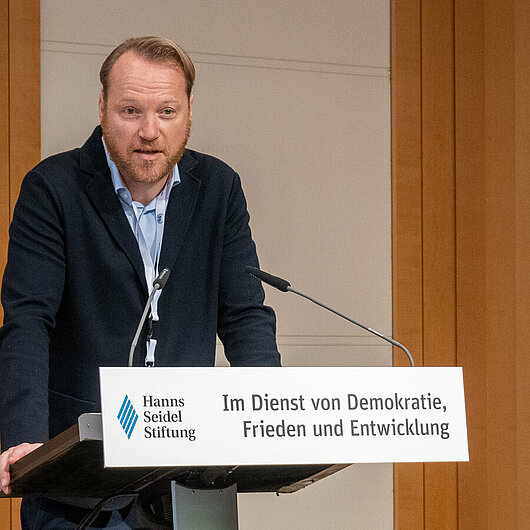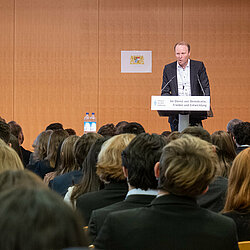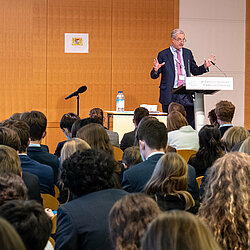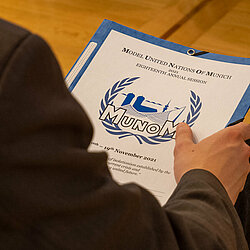Once again, students from all over Europe came to Munich in November to take on the roles of delegates to the United Nations. Since in times of the pandemic it is still not a matter of course that everyone can meet in person, an overarching theme was obvious: the increasing isolation, in the political sense as isolationism, but also as a general social tendency. In the previous year, MunoM had to isolate itself and take place as a distance event. This year's MunoM conference was attended by almost 300 students. The Hans Seidel Foundation made its premises available so that an intensive exchange was possible - of course in compliance with strict hygiene measures, including regular tests, all of which came back negative.
An official setting is an important part of this UN General Assembly simulation. The opening ceremony was first addressed by teacher Christian Waedt, who coordinates the organisation of the MunoM conference as head of the Board of Directors. He thanked his Board colleague Margarette Banatte-Schuster and the many other teachers who contribute to the success of the conference in the background. The Director of the Secondary School of the European School Munich, Martin Duggen, put the importance of public debates at the centre of his speech. After all, there should be no lack of discussions on current topics at the conference. Anton Hrovath, Director of the European School Munich, addressed the tension between the need for personal isolation due to the pandemic and the quest for common solutions to the same. Rainer Osterwalder, Press Officer and Director of Media Relations at the European Patent Office, then recalled the beginnings of MunoM in the 1990s and how much world politics and society have changed since then. He noted that the world has developed differently than many expected at the time, but that with technology and information, there are means to overcome isolationism.
Inspired by the speeches, the students started their committee work. The aim of MunoM is to convey a realistic picture of political processes, to arouse interest in issues and to train debating skills. In the roles of delegates of the different nations, the pupils discussed various topics in the fields of economy, security, culture and human rights in order to adopt joint resolutions at the end of the conference.
The European School Munich and the MunoM organisers thank all participants for their commitment. Special thanks go to the European Patent Office for its support over the years, to the Bavarian Ministry of Education as sponsor and to the Hans Seidel Foundation for providing the premises.
Further information on MunoM can be found here at esmunich.de and on the MunoM website.





